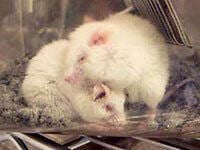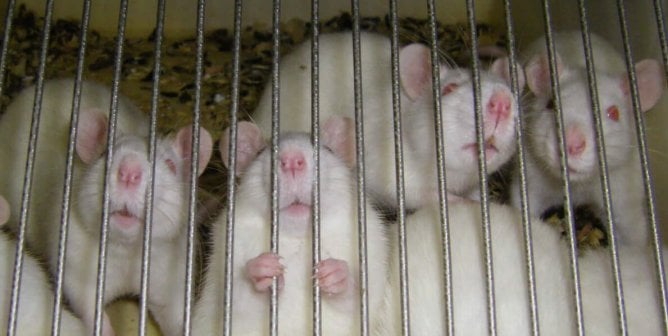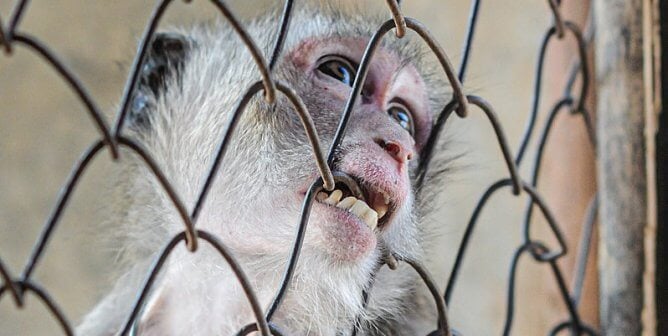Animals in Government-Required Testing
Regulatory agencies, such as the U.S. Food and Drug Administration (FDA), the U.S. Environmental Protection Agency (EPA), and other agencies around the world require companies to test chemicals, pesticides, pharmaceuticals, and other products before they are brought to market in order to predict their potential toxicity to humans or the environment.
Each year, millions of animals are used in these tests. Animals are forced to ingest or inhale toxic substances or are injected with them before finally being killed and dissected. Most of these animal tests were developed many decades ago and lack reliability and human relevance.
The toxicity of a substance can be more reliably and quickly assessed using non-animal methods. Many scientifically sound non-animal methods already exist and can be used today, and many more are in development. PETA calls on regulatory agencies to facilitate further development of non-animal methods and to rely on these tests, which are more relevant and can better protect us and our environment.
Click here to read an overview of government-required testing and the non-animal methods that are replacing tests on animals.
PETA’s Regulatory Work
PETA started working on regulatory testing in 1998, holding negotiations with the White House and the EPA that greatly reduced the number of animals slated to be used in the agency’s high production volume (HPV) chemical-testing program—by the millions!
Since then, our team has grown and we’ve achieved many positive changes, just a fraction of which are included below:
- As mentioned above, following negotiations, scientific testimony, and campaigning by PETA, the White House made significant changes to the U.S. government’s HPV chemical-testing program—immediately sparing more than 800,000 animals. In the years that followed, PETA commented on every proposed test plan and worked with companies and the EPA to spare millions of additional animals.
- Following years of efforts by PETA—including lobbying, presenting at conferences, participating in working groups, publishing op-eds, and submitting legal petitions, technical comments, and testimony as well as nearly 25,000 responses to our action alert—the EPA agreed to incorporate many of PETA’s recommendations for prioritizing the use of non-animal test methods into its Endocrine Disruptor Screening Program, which had the potential to kill tens of millions of animals. Further efforts helped push the agency to incorporate results from these non-animal test methods into its program as a step toward its stated goal of developing a set of in vitro methods to replace all animal studies in the program.
- PETA fought the Center for Science in the Public Interest’s request to the FDA that a natural plant-based sweetener be tested on animals—and won.
- When the Sierra Club and other groups wanted the EPA to require animal experiments for air fresheners, PETA presented an analysis showing that additional testing was unnecessary—and the EPA agreed.
- Former President Barack Obama signed into law the Frank R. Lautenberg Chemical Safety for the 21st Century Act to modernize chemical toxicity testing requirements following decades of work by PETA to convince the public, regulators, and scientists that testing industrial chemicals on animals is cruel and does not protect public health or the environment.
- PETA worked with a personal lubricant company to persuade the FDA to accept results from simple, non-invasive skin tests on human volunteers instead of requiring that rabbits and guinea pigs be injected with personal lubricants to determine whether they would cause skin irritation or allergic reactions. This spared the lives of the animals who would have been used and also sets a clear precedent enabling other companies to use tests that don’t require animals.
Read about more victories here.
Meet PETA’s Regulatory Toxicology Department
This team of experts is leading the way in advancing non-animal approaches that meet federal and international testing requirements.
-
- Amy Clippinger, Ph.D.
Amy Clippinger has a Ph.D. in cellular and molecular biology and genetics and several years of research experience at the University of Pennsylvania. She is the managing director of the Regulatory Toxicology Department.
-
- Adam Bettmann, M.S., DABT
Adam Bettmann has a master’s degree in regulatory toxicology from the University of Minnesota and is a Diplomate of the American Board of Toxicology (DABT).
-
- Jeff Brown
Jeff Brown studied epidemiology and public health at George Washington University after receiving his undergraduate degree in cell and molecular biology.
-
- Katherine Groff, M.S.
Katherine Groff has an undergraduate degree in biology from the University of Notre Dame and a master’s degree in natural resource management, with a focus on environmental policy, from Michigan State University.
-
- Gina Hilton, Ph.D.
Gina Hilton has a Ph.D. in toxicology from North Carolina State University and a master’s degree in chemistry from Wake Forest University.
-
- Monita Sharma, Ph.D.
Monita Sharma has a Ph.D. in biomedical sciences from Wright State University, with nanotoxicology as her main area of research.
-
- Anna van der Zalm, M.S.
Anna van der Zalm has a master’s degree in chemistry from the University of Oxford.
PETA’s Regulatory Toxicology Department works with researchers around the globe and has spared millions of animals deadly toxicity tests.









